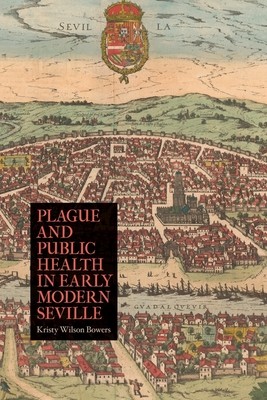
- We will send in 10–14 business days.
- Author: Kristy Wilson Bowers
- Publisher: University of Rochester Press
- ISBN-10: 1580464513
- ISBN-13: 9781580464512
- Format: 15.2 x 22.9 x 1.3 cm, kieti viršeliai
- Language: English
- SAVE -10% with code: EXTRA
Plague and Public Health in Early Modern Seville (e-book) (used book) | bookbook.eu
Reviews
Description
This study of sixteenth-century Seville offers a new perspective on how early modern cities adapted to living with repeated epidemics of plague.
Plague and Public Health in Early Modern Seville offers a reassessment of the impact of plague in the early modern era, presenting sixteenth-century Seville as a case study of how municipal officials and residents worked together to create a public health response that protected both individual and communal interests. Similar studies of plague during this period either dramatize the tragic consequences of the epidemic or concentrate on the tough "modern" public health interventions, such as quarantine, surveillance and isolation, and the laxness or strictness of their enforcement. Arguing for a redefinition of "public health" in the early modern era, this study chronicles amore restrained, humane, and balanced response to outbreaks in 1582 and 1599-1600 Seville, showing that city officials aimed to protect the population but also maintain trade and commerce in order to prevent economic disruption.Based on extensive primary sources held in the municipal archive of Seville, the work argues that a careful reading of the records shows a critical difference between how plague regulations were written and how they were enforced, a difference that reflects an unacknowledged process of negotiation aimed at preserving balance within the community. The book makes important contributions to the study of early modern city governance and to the historiography of epidemics more broadly. Kristy Wilson Bowers received her PhD from Indiana University and teaches in the History Department at Northern Illinois University.
EXTRA 10 % discount with code: EXTRA
The promotion ends in 21d.07:56:26
The discount code is valid when purchasing from 10 €. Discounts do not stack.
- Author: Kristy Wilson Bowers
- Publisher: University of Rochester Press
- ISBN-10: 1580464513
- ISBN-13: 9781580464512
- Format: 15.2 x 22.9 x 1.3 cm, kieti viršeliai
- Language: English English
This study of sixteenth-century Seville offers a new perspective on how early modern cities adapted to living with repeated epidemics of plague.
Plague and Public Health in Early Modern Seville offers a reassessment of the impact of plague in the early modern era, presenting sixteenth-century Seville as a case study of how municipal officials and residents worked together to create a public health response that protected both individual and communal interests. Similar studies of plague during this period either dramatize the tragic consequences of the epidemic or concentrate on the tough "modern" public health interventions, such as quarantine, surveillance and isolation, and the laxness or strictness of their enforcement. Arguing for a redefinition of "public health" in the early modern era, this study chronicles amore restrained, humane, and balanced response to outbreaks in 1582 and 1599-1600 Seville, showing that city officials aimed to protect the population but also maintain trade and commerce in order to prevent economic disruption.Based on extensive primary sources held in the municipal archive of Seville, the work argues that a careful reading of the records shows a critical difference between how plague regulations were written and how they were enforced, a difference that reflects an unacknowledged process of negotiation aimed at preserving balance within the community. The book makes important contributions to the study of early modern city governance and to the historiography of epidemics more broadly. Kristy Wilson Bowers received her PhD from Indiana University and teaches in the History Department at Northern Illinois University.


Reviews